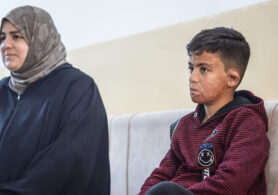In the fifth podcast episode of the Warpod’s ‘Reckoning with 9/11, Remote Warfare and Countering Violent Extremism (CVE)’, hosts Larry Attree and Delina Goxho are joined by Dan Mahanty, Victoria Ohaeri, Abigail Watson, Graeme Simpson, and Jordan Street. The first half of the podcast focuses on remote warfare, whilst the second half looks closely at CVE.
Watson provides us with an understanding of remote warfare and the techniques involved. These include airstrikes, private military contractors, intelligence sharing, and so forth. Watson argues that states use remote warfare for two objectives. The first allows policy makers to keep counterterrorism campaigns away from public debate and legal consequences. The second shifts the responsibility to external parties, such as militias, partners, and state forces.
Mahanty builds upon Watson’s views and indicates that in 2008 Western governments adopted the remote warfare doctrine. During this period, governments looked past the actions of global crises and failures of legitimacy, and instead focused largely on how to counter terrorism. The reliance on international governments and local groups, such as militias, was appealing to Western authorities because of their avoidance of the political and tactical costs. Mahanty indicates that the use of remote warfare has unfortunately weakened the international norms and has eroded human rights. Watson adds onto this by indicating that Western governments who have provided countries with weapons have also been vulnerable to manipulation by these international authorities.
As an exemplary case of how governments respond to terrorism and extremism, Ohaeri is given the floor to discuss Boko Haram in Nigeria. She discusses how Western governments, such as the U.S. have funded and trained the Nigerian military to wage war against terrorist groups including Boko Haram and the branches of it. This leads into the next subject, CVE.
CVE was a programme introduced by Obama to prevent individuals from “engaging in violence associated with radical political, social, cultural, and religious ideologies and groups” (Holmer, 2013). This programme involves the deradicalisation and rehabilitation of individuals who have engaged in violent extremism. Street and Simpson largely discuss the benefits and risks of CVE. This strategy is often criticised for its lack of definitional clarity by the United Nations and its risk of targeting minorities.
Both the use of remote warfare and CVE have contributed to the weakening of the international community and human rights. This has been primarily due to the lack of legitimacy and transparency among governments, as well as the vague definitional clarity of CVE. This episode therefore highlights the challenges that rise from these concepts.
Information about the speakers: Dan Mahanty, Director of CIVIC’s U.S. programme, Victoria Ohaeri, founder and director of Spaces for Change, Abigail Watson, Safeworld’s Conflict & Security Policy Coordinator, Graeme Simpson, Director of Interpeace USA and Lead Author of the Progress Study on Youth, Peace and Security, and Jordan Street, Safeworld’s Policy and Advocacy Adviser.
This post was written by IRW LAB student Eva Akerboom.



